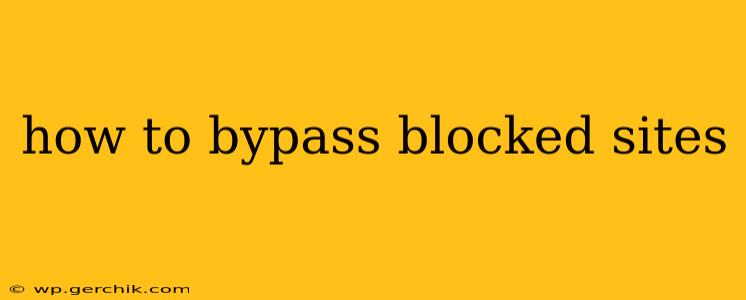Accessing blocked websites can be frustrating, whether it's due to restrictions at work, school, or geographical limitations. While bypassing blocks isn't always ethical or legal, understanding the methods and their implications is crucial. This guide explores various techniques, their effectiveness, and associated risks.
Why are Websites Blocked?
Before diving into bypassing methods, let's understand why websites might be blocked. Common reasons include:
- Workplace policies: Many companies block websites deemed unproductive or distracting during work hours. This often includes social media, gaming sites, and streaming services.
- School restrictions: Educational institutions frequently block sites deemed inappropriate or irrelevant to the learning environment. This can encompass content with mature themes, violence, or distracting elements.
- Government censorship: In some countries, governments actively block websites containing political dissent, social commentary, or information deemed undesirable.
- Geographical limitations: Streaming services and other online content providers often restrict access based on geographical location due to licensing agreements and copyright laws.
Methods for Bypassing Blocked Sites
Several methods exist to bypass website blocks, each with its own advantages and drawbacks:
Using a VPN (Virtual Private Network)
A VPN is arguably the most popular and effective method. A VPN masks your IP address, making it appear as though you're accessing the internet from a different location. This is particularly useful for bypassing geographical restrictions.
- How it works: A VPN encrypts your internet traffic and routes it through a server in a different location. This hides your real IP address, allowing you to access websites blocked in your current location.
- Pros: High effectiveness, strong security (with a reputable provider), can bypass various types of blocks.
- Cons: Can slow down internet speed, requires a subscription, some VPNs may log your activity (choose reputable, no-logs providers).
Using a Proxy Server
Similar to a VPN, a proxy server acts as an intermediary between your device and the internet. However, proxy servers generally offer less security than VPNs.
- How it works: Your requests are routed through the proxy server, masking your IP address.
- Pros: Relatively simple to use, some free options are available.
- Cons: Less secure than VPNs, slower speeds, potential for malicious proxy servers.
Using a Tor Browser
Tor (The Onion Router) is a free and open-source browser designed to enhance anonymity and privacy. It routes your traffic through multiple servers, making it difficult to trace your online activity.
- How it works: Tor uses a layered encryption system to mask your IP address and protect your browsing history.
- Pros: Excellent for privacy, effective at bypassing censorship.
- Cons: Significantly slower speeds than regular browsers, potential security risks if not used carefully.
Using a Smart DNS
Smart DNS changes your DNS settings to redirect your traffic through different servers, allowing you to access geo-restricted content.
- How it works: It alters your DNS records to mask your location.
- Pros: Faster than VPNs, often easier to set up.
- Cons: Less secure than VPNs, may not bypass all types of blocks.
Are There Risks Involved?
Yes, there are inherent risks associated with bypassing blocked sites:
- Security risks: Using unreliable VPNs or proxy servers can expose your device to malware and data breaches.
- Legal consequences: In some jurisdictions, bypassing certain types of blocks is illegal.
- Violation of terms of service: Many companies and institutions have policies prohibiting the use of methods to bypass their website blocks.
Choosing the Right Method
The best method for bypassing blocked sites depends on your needs and circumstances. For enhanced security and reliability, a reputable VPN is recommended. However, if speed is a priority, a Smart DNS might be a better option. Remember to always choose reputable providers and be aware of the potential risks.
Is it Ethical to Bypass Blocked Sites?
The ethics of bypassing blocked websites are complex and depend heavily on context. Bypassing restrictions at work or school for non-essential activities is generally considered unethical and potentially a violation of rules. However, bypassing censorship in countries with restricted internet access can be viewed as an act of defiance and a means of accessing vital information. Consider the ethical implications before attempting to bypass any website blocks.
What are the legal implications of bypassing blocked sites?
The legality of bypassing blocked sites varies depending on the jurisdiction and the nature of the website being accessed. Bypassing blocks for accessing copyrighted material or engaging in illegal activities carries significant legal risks. Always respect local laws and regulations.
This guide provides a comprehensive overview of how to bypass blocked sites, but remember to proceed with caution and prioritize your online safety and security. Always consider the ethical and legal implications before employing any of these methods.
